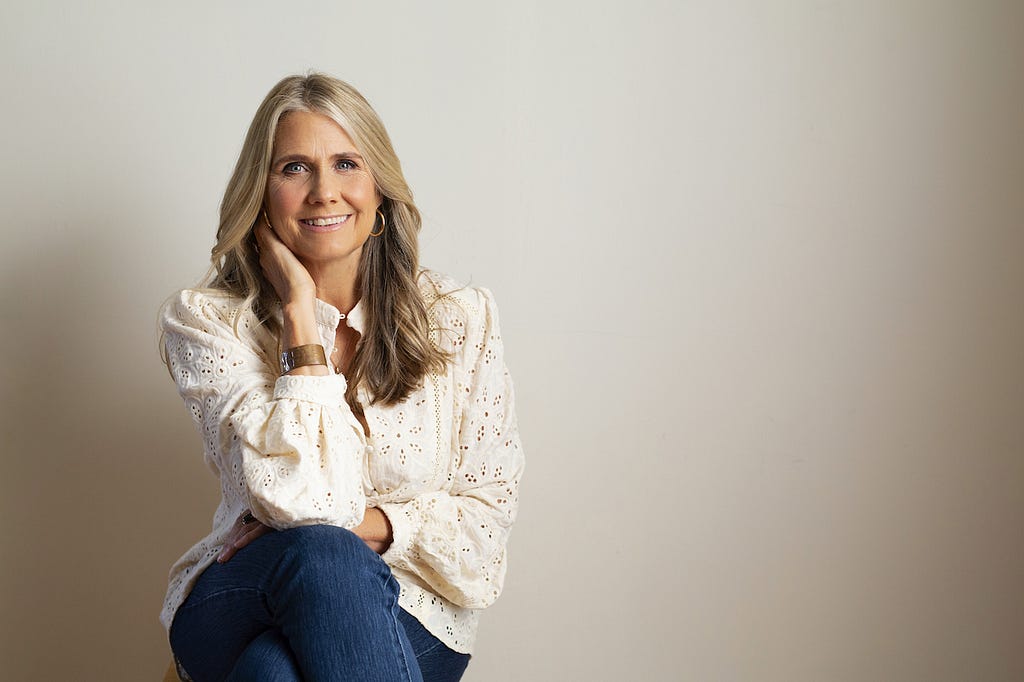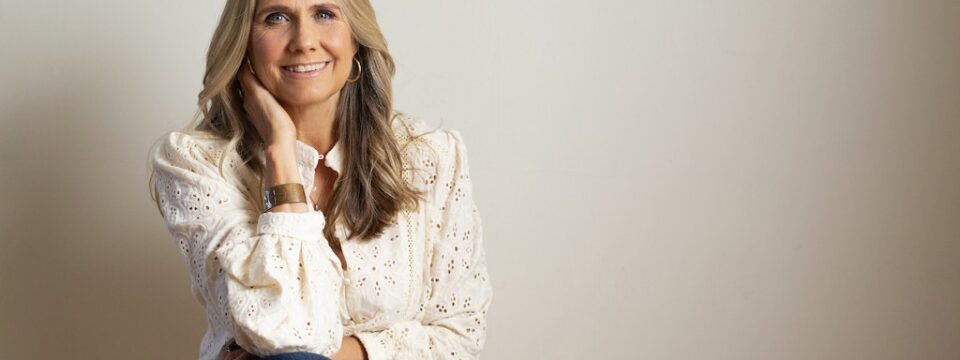
Learn how to communicate well. This also includes asking for what you need, speaking openly and honestly, standing up for yourself, and being a good listener.
As part of my series about “authors who are making an important social impact” I had the pleasure of interviewing Elizabeth Gould, author of The Well of Truth (https://www.elizabethagouldstories.com).
Elizabeth Gould has long been fascinated with feminine archetypes, mythology, and rites of passage. She has taught and mentored girls at puberty and is the former director of a non-profit dedicated to positive menstrual/menopausal education and awareness. She holds a BA in Art History from Stanford University and an MS in Education from the State University of New York.
The themes in The Well of Truth grew organically out of her two decades of experience as a mother, teacher, and menstrual advocate. The stories incorporate her love of art, travel, mythology, goddess traditions, trees, storytelling, and the moon. The Well of Truth is her first book.
Thank you so much for joining us in this interview series! Before we dive into the main focus of our interview, our readers would love to “get to know you” a bit better. Can you tell us a bit about your childhood backstory?
I grew up in a large, creatively-minded family, where my siblings and I were encouraged to follow our artistic inclinations. As an avid reader and a journal keeper, I was captivated by the power of a good story. I immersed myself in fairytales, myths, and legends from faraway places and developed a passion for storytelling, a skill that later came in handy as a school teacher and mother.
In school, I was fascinated by the cultures of ancient Egypt, Greece, and Rome; I was particularly drawn to stories that featured goddesses and female divinities. I went on to study Art History at university, fusing my love for myth and history with visual storytelling.
There was one specific moment in my childhood that made a huge impression on my burgeoning imagination: In 1978, my parents took me to see the King Tut exhibit when it came to Los Angeles. I was absolutely spellbound by the lavishness of the royal tomb: the mummy, the jewelry, cryptic hieroglyphics, mysterious funerary objects, the Egyptian deities, and all that gold! Seeing the exhibit brought Egyptian culture to life for me in an extraordinary way.
In my twenties, I had the opportunity to travel around the world, which opened my eyes to other religious/spiritual traditions that were different from my Christian upbringing.
When you were younger, was there a book that you read that inspired you to take action or change your life? Can you share a story about that?
Off the top of my head, these books inspired me when I was younger and in some way influenced “The Well of Truth.”
- D’Aulaires’ “Book of Greek Myths” was a classic! The myths were told in a very accessible way, and the illustrations are quite marvelous too.
- “The Complete Fairytales” and “Princess and the Goblin” by 19th-century Scottish writer George MacDonald. These stories are so mystical and evocative that I enjoy reading them now as much as I did when I was young.
- In my mid 20’s, I read “Women Who Run with Wolves’’ by Clarissa Pinkola Estes. I only made it halfway through the book because the subject matter was way over my head; Even so, the book awakened something inside me about the power of feminine archetypes. I re-read the book when I turned 50 and could not put it down! I’m so grateful for the spiritual road map this book offers to women.
- I resonate strongly with “All About Love: New Visions” by bell hooks. Her writing has helped me unpack the dynamics of male/ female relationships in our modern society.
Can you share the funniest or most exciting mistake that occurred to you in your career? What lesson or takeaway did you learn from that?
This isn’t a funny story, but I feel it’s an important one. When I took on the role of Executive Director of a nonprofit focused on positive menstrual/menopausal education and awareness, I felt very strongly about empowering women by reducing the taboo associated with women’s health and well-being.
About ten years ago, while attending an International Women’s Day conference, I was approached by a well-dressed older woman who proceeded to berate me and the non-profit I worked for, saying that our mission was a disgrace and a waste of time. I was shocked because I assumed that everyone at the event was there to uplift and celebrate women. Yet, when I looked into the woman’s eyes, I saw so much pain. I realized that her tirade wasn’t a personal attack on me; she was projecting a deeply ingrained sense of shame, embarrassment, and unworthiness that many women feel about themselves and their bodies. The encounter shook me, but it also reinforced my commitment to work on healing the stigma that has held women down for so long.
Can you describe how you aim to make a significant social impact with your book The Well of Truth?
The Well of Truth tells the story of a modern woman who develops a connection to her soul by tapping into the archetypal energies within her and resourcing herself from the natural world around her. The themes in the book coincide with the inquiry many of us have had over these past few years of the pandemic as we re-evaluate what we need to live a meaningful, authentic life.
Can you share the most exciting story in your book with us?
The book contains twenty-four short stories that follow the heroine named Grace through poignant moments in her adult life, such as getting married, going through childbirth, and holding vigil at a friend’s deathbed.
If I had to pick just one story, I would say that the first chapter is the most exciting one. The story begins with Grace, freshly graduated from university, wondering what she is meant to do with her life. She decides to take a trip to Scotland to explore her ancestry, hoping that by knowing where she comes from, she will understand who she is and what she’s meant to become. She learns of a sacred well on a remote Scottish island that is said to reveal one’s true self. When she finds the well, she is surprised by what she sees when she looks inside.
What was the “aha moment” or series of events that made you decide to bring your message to the world? Can you share a story about that?
I wrote these stories as a personal creative project while I was busy raising a family. In some way, it was my attempt to understand and integrate my experiences as a woman in modern culture. It was important to me that the stories were grounded in reality but also had a magical quality to them.
The big “aha” moment happened when I gathered some girlfriends together and read my stories to them. Not only was I amazed by the enthusiastic response I received, but also by how the themes of the stories sparked deep conversation among my friends. We stayed up quite late that night, sharing our personal stories — many of which had never been told before. It was a powerful and transformative moment.
Without sharing specific names, can you tell us a story about a particular individual who was impacted or helped by your cause?
I consider myself very fortunate to have many wonderful and creative souls in my life. In particular, I have a friend who is an accomplished writer and poet — I call her my fairy godmother. She held the vision of me as a published writer long before I could imagine myself as
one. Over the years, she has created several opportunities for me to shine- always lifting me up and keeping me going so that I could step into a bigger version of myself.
Are there three things the community/society/politicians can do to help you address the root of the problem you are trying to solve?
In my studies and in my life experience, I have come to understand that as human beings, we hold both masculine and feminine energies within us. However, in our modern society, with its emphasis on power, control, and speed, these energies are completely out of balance. We need now to call forth values and traits traditionally associated with the feminine, such as empathy, inclusion, and nurturance. Also, I believe that prioritizing women’s well-being promotes healing and integration for everyone involved. When a woman feels supported and well resourced, it is much easier for her to access her inner wisdom and creative powers.
How do you define “Leadership”? Can you explain what you mean or give an example?
Authentic leadership incorporates values such as collaboration, honoring diverse points of view, coming from a place of goodwill, and being a good steward of all life on the planet. We desperately need to find more co-creative, heart-centered approaches to the problems we face. Unfortunately, we are not seeing enough of this kind of leadership in the world today.
What are your “5 things I wish someone told me when I first started,” and why? Please share a story or example for each.
- Learn how to communicate well. This also includes asking for what you need, speaking openly and honestly, standing up for yourself, and being a good listener.
- Take good care of your physical body. It is a tremendous gift that we often take for granted.
- Be kind to yourself. When you can accept and celebrate yourself just as you are, you won’t waste a moment feeling unworthy or not good enough.
- Know that you have a choice. It may not always feel like you do when you’re not able to change a situation, but you always have a choice about your attitude. How can I accept my life experiences and find the gifts in them?
- Don’t compare yourself with others; a self-to-self comparison over time is a much more rewarding pursuit.
Can you please give us your favorite “Life Lesson Quote”? Can you share how that was relevant to you in your life?
“Maturity is the ability to live in an imperfect world joyfully.” Richard Rohr Somehow, I feel this quote doesn’t need any explanation!
Is there a person in the world or the US with whom you would like a private breakfast or lunch, and why? They might just see this, especially if we tag them. 🙂
Hands down, it would be Oprah Winfrey. That woman is truly a legend.
How can our readers further follow your work online?
My website: elizabethagouldstories.com
This was very meaningful, thank you so much. We wish you only continued success on your great work!
Social Impact Authors: How & Why Author Elizabeth Gould Is Helping To Change Our World was originally published in Authority Magazine on Medium, where people are continuing the conversation by highlighting and responding to this story.
